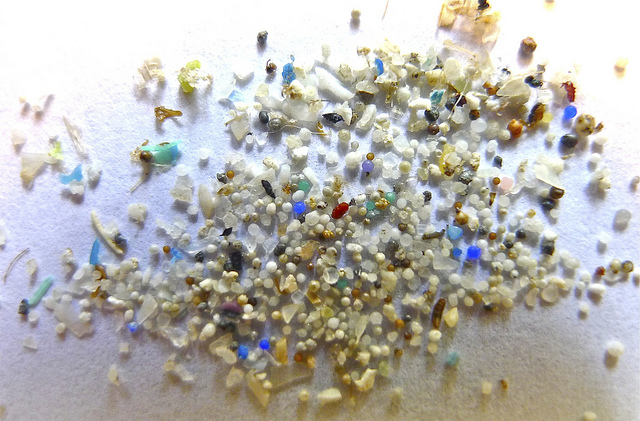Przejdź do trybu offline z Player FM !
Ep 10. Why Were Plastic Mirobeads Banned? Marine Debris and Sustainable Plastics
Manage episode 308842569 series 3021653
Plastic debris in our water is a huge pollution problem, and just one source of that pollution is the tiny microbeads that have been widely used in personal care products. In this episode of the podcast, we interview Dr. Richard Thompson, a Professor of Marine Biology at Plymouth University and an expert on the effects of plastic debris in the marine environment. We discuss the recent federal ban on microbeads and what consumers can do to be more sustainable in our day-to-day use of plastics.
 Plastic microbeads (image by MPCA photos)
Plastic microbeads (image by MPCA photos)
Want more podcast episodes? You can find them all on our podcast page, or you can subscribe on iTunes or Stitcher. You can also find us on the National Science Foundation's Science360 Radio network.
ABOUT THIS EPISODE
Related links :
- Marine Debris: Are There Solutions to this Global Environmental Problem? - video of a presentation by Dr. Thompson at the Global Wave Conference
- H.R.1321 - Microbead-Free Waters Act of 2015
- Ban on Microbeads Proves Easy to Pass Through Pipeline, by John Schwartz. New York Times, Dec 22, 2015
- [Scientists Now Know Why Some Seabirds Eat So Much Plastic] (http://www.theatlantic.com/science/archive/2016/11/plastics-in-the-ocean-smell-like-food-to-seabirds/507092/), by Ed Yong. The Atlantic, Nov 9, 2016
- Plastic Island: How our throwaway culture is turning paradise into a graveyard, by Nick Paton Walsh, Ingrid Formanek, Jackson Loo and Mark Phillips. CNN.com, 2016.
- Oct 11, 2016: Covestro Lecture in Sustainability: Plastic Debris in
the Ocean - Center for Sustainable Polymers
- Center for Sustainable Nanotechnology
Interviewee: Prof. Richard
Thompson
Producers/Narrators: Miriam Krause and Stephanie Mitchell
Music source: Music by Ketsa
50 odcinków
Manage episode 308842569 series 3021653
Plastic debris in our water is a huge pollution problem, and just one source of that pollution is the tiny microbeads that have been widely used in personal care products. In this episode of the podcast, we interview Dr. Richard Thompson, a Professor of Marine Biology at Plymouth University and an expert on the effects of plastic debris in the marine environment. We discuss the recent federal ban on microbeads and what consumers can do to be more sustainable in our day-to-day use of plastics.
 Plastic microbeads (image by MPCA photos)
Plastic microbeads (image by MPCA photos)
Want more podcast episodes? You can find them all on our podcast page, or you can subscribe on iTunes or Stitcher. You can also find us on the National Science Foundation's Science360 Radio network.
ABOUT THIS EPISODE
Related links :
- Marine Debris: Are There Solutions to this Global Environmental Problem? - video of a presentation by Dr. Thompson at the Global Wave Conference
- H.R.1321 - Microbead-Free Waters Act of 2015
- Ban on Microbeads Proves Easy to Pass Through Pipeline, by John Schwartz. New York Times, Dec 22, 2015
- [Scientists Now Know Why Some Seabirds Eat So Much Plastic] (http://www.theatlantic.com/science/archive/2016/11/plastics-in-the-ocean-smell-like-food-to-seabirds/507092/), by Ed Yong. The Atlantic, Nov 9, 2016
- Plastic Island: How our throwaway culture is turning paradise into a graveyard, by Nick Paton Walsh, Ingrid Formanek, Jackson Loo and Mark Phillips. CNN.com, 2016.
- Oct 11, 2016: Covestro Lecture in Sustainability: Plastic Debris in
the Ocean - Center for Sustainable Polymers
- Center for Sustainable Nanotechnology
Interviewee: Prof. Richard
Thompson
Producers/Narrators: Miriam Krause and Stephanie Mitchell
Music source: Music by Ketsa
50 odcinków
Wszystkie odcinki
×Zapraszamy w Player FM
Odtwarzacz FM skanuje sieć w poszukiwaniu wysokiej jakości podcastów, abyś mógł się nią cieszyć już teraz. To najlepsza aplikacja do podcastów, działająca na Androidzie, iPhonie i Internecie. Zarejestruj się, aby zsynchronizować subskrypcje na różnych urządzeniach.




